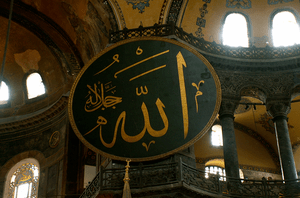Allāhu Akbar is one of the most magnificent phrases a human being can ever utter. Allāhu Akbar is a declaration of Allah’s grandeur, and an affirmation of our submission to His majesty. We remind ourselves through Allāhu Akbar that Allah is the greatest over everything: in His essence, in His power, in His honour, and in His majesty. Allah is the King of kings unto whom everything is subservient.
Internalising اَللّٰهُ أَكْبَرُ
On uttering the phrase Allāhu Akbar, we are saying that Allah is greater than everything in our hearts. It is not sufficient to simply say this phrase. We must also believe it. To be sincere in our utterance, we cannot give greater importance to something or someone other than Allah in our hearts. He has to be the One.
Each time we utter the phrase Allāhu Akbar, let us remind ourselves of the greatness of Allah and say: Allah is Greater… He is greater than us, greater than our desires, greater than our loved ones, greater than our hobbies, greater than the most powerful armies and empires, greater than everything. Each time we utter the phrase Allāhu Akbar, let us renew our īmān in Him, and let us strengthen our bond with Him.
As our knowledge of Allāhu Akbar deepens, our awe and fear of Allah should increase. Subsequently, this should lead us to venerating Allah, loving Him, obeying Him, worshipping Him in the best manner, turning towards Him with full dedication and trusting in Him alone.
A firm belief in the greatness of Allah should lead us to constantly remember, thank and praise Him with our tongues. It should shake the body into humbling itself, feeling its own insignificance, and rushing to worship Him.
Saying Allāhu Akbar with conviction should make us appreciate the greatness of our Creator. When we remind ourselves of His greatness, our self-importance should disappear as we remember how weak and insignificant we are. Saying Allāhu Akbar should safeguard us from pride as we will no longer think of ourselves or what we possess as great.
One of the Best Forms of Dhikr
Allāhu Akbar is one of the best forms of remembering our Creator. It is a great act of worship. One of the earliest commandments of Allah to His beloved ﷺ was: وَرَبَّكَ فَكَبِّرْ Proclaim the greatness of your Lord! (74:3).
Elsewhere, Allah (ʿazza wa jall) says, وَكَبِّرْهُ تَكْبِىْرًا Proclaim His limitless greatness! (17:111).
ʿUmar b. al-Khaṭṭāb (raḍiy Allāhu ʿanhu) said, “The slave’s utterance of Allāhu Akbar is better than the world and all that it contains.”
Allāhu Akbar is a phrase that has brought about wonders throughout the history of Islam. Allāhu Akbar is the echo of the battlefield. By repeating it, the warriors in the path of Allah feel the honour, power and closeness of Allah to them. They derive from Allāhu Akbar strength, steadfastness and sincerity. Allāhu Akbar enables them to overcome their enemies, wipe out corruption, and bring arrogant tyrants to their knees.
Allāhu Akbar is a tremendous phrase and a powerful source of protection. When shayṭān hears it, he feels small and insignificant, and hastily retreats. Allāhu Akbar solves problems, removes stress and eases worries. Allāhu Akbar cures illnesses and calms our fears. Whenever we feel overwhelmed or utterly lost and confused, Allāhu Akbar reminds us: there is someone far greater and more powerful than what we are experiencing. If we cling on to Allāhu Akbar, Allah will never abandon us.
A Phrase Repeated
Uttered in the ears of the newborn, Allāhu Akbar are the first words we hear as we enter this world. Throughout our lives, we hear this phrase repeated. Two of the five pillars of our dīn centre around this statement: ṣalāh and ḥajj. We are summoned to the masjid through the adhān, which begins with Allāhu Akbar. The iqāmah begins with Allāhu Akbar. The ṣalāh is commenced with Allāhu Akbar. Throughout ṣalāh, we move from one pillar to the next by uttering Allāhu Akbar. There is no phrase we are obligated to utter more times in a day than Allāhu Akbar.
Al-ʿIzz b. ʿAbd al-Salām (raḥimahullāh) explained that ṣalāh begins with the takbīr, indicating the grandeur of Allah, so that the slave knows who he is standing, sitting, bowing and prostrating in front of. It reminds him to humble himself to the greatness of Allah.
Once the slave becomes mindful of the grandeur of Allah, he will uphold the internal and external etiquettes of ṣalāh and purification, and he will become preoccupied with Allah alone. He will worship Allah ‘as though he can see Him’. He writes, “Whoever worships Allah in such a way has exited from the realms of the universe.” Subsequently, repeating Allāhu Akbar at each stage of ṣalāh helps us to renew our awareness of His greatness. It reminds us to embody the humility and lowliness that each posture requires.
Likewise, throughout the various rites of ḥajj and ʿumrah, Allāhu Akbar is constantly repeated. Similarly, we have been instructed to say Allāhu Akbar when the new moon is seen, as part of the takbīrāt of the two Eids, when starting a journey, when ascending (e.g. going up a hill, stairs, lifts), when slaughtering an animal, upon receiving good news, and even when seeing something burning.
It is also an established practice to say Allāhu Akbar in large gatherings, during battles, on military expeditions and upon achieving victory. This is to instil a sense of greatness of the action being undertaken and evoke feelings of power and strength in those situations.
About the takbīr, Ibn Ḥajar (raḥimahullāh) writes, “It is a form of remembrance which has been transmitted to us to say in every difficult and happy situation. It is said to thank Allah and disassociate oneself from all that His enemies attribute to Him.”
Ibn Taymiyyah (raḥimahullāh) explained, “Takbīr has been legislated to be uttered on major occasions – either due to the large crowds; or situations which consist of actions that are great in and of themselves; or are situations that require strength etc. This is to highlight the fact that Allah is the Greatest. And no matter how big and grand these occasions may be, the greatness of Allah overpowers the hearts of the believers. The outcome of this is that the entire dīn is dedicated to Allah, and the slaves are constantly glorifying Allah.”
The Messenger of Allah ﷺ said, “No one ever utters لَا إِلٰهَ إِلَّا اللّٰهُ nor اَللهُ أَكْبَرُ except that he is given glad tidings.”
It was asked, “O Messenger of Allah, glad tidings of Paradise?” He ﷺ replied, “Yes” (Ṭabarānī).






